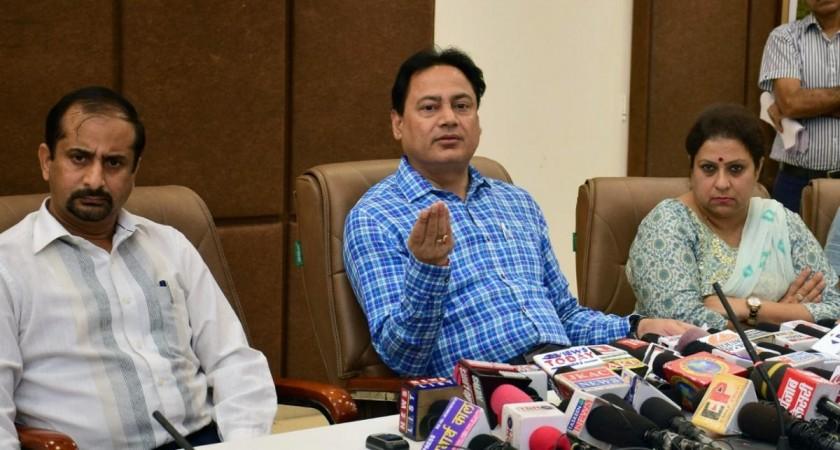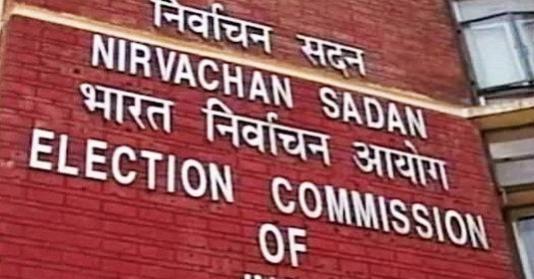Within minutes after the Chief Electoral Officer (CEO) of Jammu and Kashmir Hirdesh Kumar Singh winded up his press conference to announce the schedule for special summary revision for the Union Territory, the Kashmir-centric political parties minced no words in attacking the Election Commission of India for, what they alleged, is playing into the hands of BJP.
During his press conference, CEO Hirdesh Kumar Singh announced that after the abrogation of Article 370, any Indian citizen, who is ordinarily residing in J&K, is eligible to include his/her name in the new electoral rolls for assembly polls.
While quoting the Representation of Peoples' Act, Singh said that there is no need for a permanent resident certificate to get voting rights in the assembly elections. "One should be ordinarily residing in the area to get voting rights for assembly polls", Singh said and announced that this will be a clause in the special summary revision exercise in J&K.

"Decision to enroll people will be taken by the Electoral Registration Officer (ERO) of the area by getting authentic proof that the person is ordinarily residing in the area", he said and added that non-locals who are ordinarily residing in J&K for job, education or labourer are eligible to register as a voter.

Political parties react strongly against allowing non-locals to enroll as voters
Cutting across party lines, Kashmir-centric parties strongly reacted against this move of the Election Commission of India.
Is the BJP so insecure about support from genuine voters of J&K that it needs to import temporary voters to win seats? None of these things will help the BJP when the people of J&K are given a chance to exercise their franchise. https://t.co/ZayxjHiaQy
— Omar Abdullah (@OmarAbdullah) August 17, 2022
"Is the BJP so insecure about support from genuine voters of J&K that it needs to import temporary voters to win seats? None of these things will help the BJP when the people of J&K are given a chance to exercise their franchise", former Chief Minister and vice president of National Conference Omar Abdullah reacted.
GOIs decision to defer polls in J&K preceded by egregious gerrymandering tilting the balance in BJPs favour & now allowing non locals to vote is obviously to influence election results. Real aim is to continue ruling J&K with an iron fist to disempower locals. https://t.co/zHzqaMseG6
— Mehbooba Mufti (@MehboobaMufti) August 17, 2022
Mincing no words in attacking Chief Electoral Officer (CEO), ex-Chief Minister and president of Peoples' Democratic Party (PDP) Mehbooba Mufti termed this step as a design of BJP to capture power.
"GOIs decision to defer polls in J&K preceded by egregious gerrymandering tilting the balance in BJPs favour and now allowing non-locals to vote is obviously to influence election results. The real aim is to continue ruling J&K with an iron fist to disempower locals", she reacted.
This is dangerous. I don’t know what they want to achieve. This is much more than a mischief. Democracy is a relic especially in the context of Kashmir. Please remember 1987. We r yet to come out of that.
— Sajad Lone (@sajadlone) August 17, 2022
Don’t replay 1987. It will be as disastrous. https://t.co/STU1U7hAgi
"This is dangerous. I don't know what they want to achieve. This is much more than mischief. Democracy is a relic, especially in the context of Kashmir. Please remember 1987. We r yet to come out of that. Don't replay 1987. It will be as disastrous", Peoples' Conference chairman Sajjad Gani Lone tweeted.
Before August 5, 2019, only PRC holders were eligible to cast votes in assembly elections
Before the abrogation of Article 370 and 35-A, only permanent residents of Jammu and Kashmir were eligible for casting votes in the assembly elections.
What to say of non-locals, even West Pakistani Refugees, who have been living in J&K since 1947, were not eligible to cast votes in assembly elections. The same was the condition of Valmikies. Living in Jammu since 1957, these Dalits were deprived of casting votes in assembly elections due to Article 35-A. Before August 5, 2019, they were eligible for casting votes only in the Parliament elections.
After the abrogation articles 370 and 35-A, West Paksitani refugees and Valimikies are eligible to cast votes in assembly elections also.










